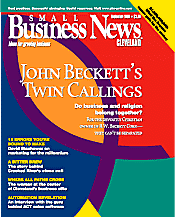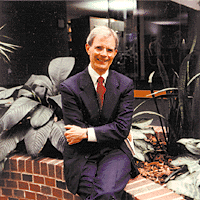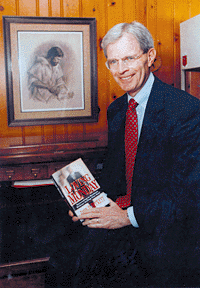
 |
The devoutly Christian owner of R.W. Beckett Corp. has infused
his company with biblical principles without running afoul of the law. His trick? Less
Bible-thumping than sincere action. And occasionally a well-chosen battle.
It was 1979, and for the second time in six years, OPEC had stopped shipments to the
developed world in order to drive up the price of oil.
While American consumers stood fuming in lines at the gas station, the second oil shock was more than an inconvenience for John Beckett.
Beckett is the second-generation owner of Elyria-based R.W. Beckett Corp., a privately held manufacturer of residential oil burners and related products.
With oil prices doubling in just weeks to $1.40 a barrel, and amid panicked speculation of $50 barrels before long, the very viability of his industry was in question.
In that feverish environment, he gathered his senior management team to make some hard decisions. In search of answers, Beckett and his managers bowed their heads and prayed.

"What we did as a management group was to really commit that whole situation to prayer," Beckett recalled recently. "Our undergirding confidence was that our God is bigger than Mideast oil."
In time, that yielded a consensus: Rather than retreat into a protective crouch, the company would devote more resources to the market. "The natural response would have been to rein things in; our competitors all did. They cut their advertising, they cut their sales efforts. They basically tried to go into a bunker," Beckett says. "But we felt we had to be more aggressive.... We basically said, 'We think this is a short-term situation, and there's a long-term future to what we're doing.'"
The following years did, in fact, bring consolidation. While as many as 400 companies served the niche in the early 1950s, by the mid-'80s only a handful remained to serve the 12 million American homes still heated by oil furnaces.
And R.W. Beckett, with just 3 percent of the U.S. market when young John took over in 1965 upon his father's death, and about 20 percent before the first embargo in 1973, now had a market share of about 80 percent.
"I would say they're regarded as the leader of the market," says Bob Greenes, a prominent fixture in the residential oil-heating industry since 1947, who now runs a Manhattan-based consulting company, Petroconsult.
Resorting to group prayer in the face of corporate trauma isn't for every company, of course. But at R.W. Beckett, where faith has frequently been put to the test, it's difficult to argue with the results that biblically oriented management delivers.
The popular image of born-again Christians is mostly one of crude caricatures. Either they're painted as reproachful intolerants, rigid and constitutionally incapable of enjoying life, or as out-of-touch sentimentalists who won't rest until everyone sees the world as they do.
As with all cartoon renderings, the reality is very different in the case of John Beckett and the company he runs. And Beckett himself, well aware of the polarizing nature of so much Christian fundamentalist rhetoric, has played an active role in recasting the debate.

"I've tried to be careful of what I'll call in-house language," Beckett says. "In Christian circles, we all tend to develop a kind of lingo that basically doesn't communicate with outsiders."
So Beckett has developed his own language to discuss the close and specific relationship between religion-his religion-and business-his business. A company where top managers pray in a group becomes "biblically based"-a phrase that is part description and part euphemism.
He's especially well-aware of the potential for polarization between fundamentalist Christians and those who are distrustful of their intentions because he used to be in the latter camp himself.
His artful straddling of these two generally warring camps is facilitated by the fact that both he and his company are simultaneously humane and built of sturdy, market-tested stuff.
Beckett Corp., after all, annually produces about 400,000 precision-crafted oil burners that are the class of its industry. Everywhere, from the signage in the plant to admonitions peppered throughout the thick employee handbook, the underlying message is the same: This is a company with a moral urgency about quality, service and respect for the individual, so please behave accordingly.
R.W. Beckett, the handbook notes, "is a growing, dynamic company which has achieved respect in our community and worldwide by adhering to such basic Christian principles as integrity, decency, mutual respect and excellence in all that we do-especially the quality of our work." Elsewhere, it speaks of "a wholesome environment where truth, justice and mutual respect are honored."
Owing to a series of unique challenges over more than half a century, the corporate ethos is also one of steadfastness in the face of adversity. That's perhaps best summed up in a quote by Abraham Lincoln which appears below a bust of his likeness in the company's lobby: "The occasion is piled high with difficulty, and we must rise to the occasion....The way is plain, peaceful, generous, just-a way which if followed the world will forever applaud and God must forever bless."
Yet, at the same time, the quietly joyful demeanor one observes throughout the company-from the 50ish women in shorts and heavy work boots who operate forklifts in the plant, to the secretarial staff in the front office-is reminiscent of the industrial-strength peppiness of Wal-Mart greeters. (The joke among newly retired Beckett employees, in fact, is that they can now go work for Wal-Mart.)
Marcia, an 18-year veteran of the company, leads a visitor on a tour of the brightly colored plant, so clean, strikingly attractive and well-organized that even delegations from nearby Invacare Corp. have come for a look.
"You're just a number in a lot of plants, but I don't think anybody ever feels that way here," she says. "It's the atmosphere: I just feel that people here genuinely enjoy coming to work and working with their co-workers. You don't find that in a lot of places."
When the issue of religion in the workplace is broached, she's quick to observe that Beckett employs people of several faiths. "You don't have to be a Christian to work here; it's not pushed. But it's not suppressed, either." Indeed, groups of employees voluntarily gather at their lunch breaks for Bible studies in the company lunch room, a development about which management maintains strict neutrality, neither encouraging nor impeding it. "We just make the space available," says John Beckett.

If people seem unusually happy in their work, Marcia concludes, there's little mystery in it. "I think that's because God shines through them."
That delicate balancing act of harnessing one's spiritual fervor to one's work has long fascinated John Beckett. "The interest in how to combine your faith and your work is just at a very high level in the West right now," he said last year, after returning from a European talk on that topic. At the time, he and a collaborator were struggling over a book manuscript, which aimed to describe his long internal battle between twin callings-business and God. Could the two ever really be reconciled?
By early summer of this year, that effort had yielded a newly published book, Loving Mondays: How to Succeed in Business Without Selling Your Soul. Part business memoir, part spiritual-coming-of-age tale, it chronicles his gradual awakening to a central calling for business.
Beckett describes how, as a boy raised in an Episcopalian home, he didn't come naturally to "born-again" Christianity. He recalls a friend's vain early attempts at proselytizing him. "In a word, what Dave was selling, I wasn't buying. He struck me as narrow, religious and pesky. He seemed to be locked into a formula, and I had an argument to counter every one of his neatly packaged theories."
For this bright young man who would later graduate from the elite Massachusetts Institute of Technology and work as a junior engineer for the company that produces the precision-crafted Lear jet, Christianity "involved faith, and faith didn't square with intellect."
In time, his resistance buckled under the example of his wife's family (his father-in-law, an Anglican minister, was president of a theological seminary). "For them, God wasn't aloof. He was personal," Beckett writes. "They approached him as a close friend." Still, he struggled into his late 20s, "rigidly steeled against fully yielding to anything I couldn't analyze and reason my way through. I don't want to become like one of those, I concluded, recoiling from my image of the stereotypical fundamentalist Christian-blindly accepting, dogmatic, unimaginative and just plain not much fun."
For years, he admits to having struggled with the notion of his calling. As he grew into his role with the family company, founded by his father in 1937, Beckett grew increasingly confident that business could satisfy his deeper spiritual needs. Slowly, his chronic suspicion that such a career could never be more than a mere supplement to a more direct spiritual calling-such as the ministry-began to evaporate. The realization was dawning on him that this business-if properly harnessed as a platform for service to employees, customers, vendors and the larger community-could indeed be his primary calling.
In fact, he believes that "people called to business have many opportunities for service unavailable to those who are specifically focused on ministry vocations."
In R.W. Beckett's case, that has included Advent Ministries, a separate company launched in 1979 to help people with troubled pasts-criminal records or chemical dependencies-build a temporary-work record on the way to finding permanent employment.
Perhaps it was because he had first gone through this long internal dialogue that Beckett could later seem so entirely non-threatening, almost pastoral, in his personal approach to his faith. Sitting in his office, which is dominated by his father's old rolltop desk, Beckett has the manner of a middle-aged eagle scout. His gentle movements suggest someone laboring to avoid awakening a loved one sleeping nearby. Through hours of conversation, his gentleness and economy with words never falters, even while he's enunciating some view which, coming from anyone else, would easily sound intolerant.
His intensely peaceful manner-Vice President Bob Cook, who has worked side-by-side with him for 33 years, insists the two have "never had a single argument"-sets an unspoken tone: My role isn't to convince you of anything, but merely to share some truths which I've come to learn and internalize through the years. As one attorney who has worked with him puts it, "he is just one of the most-centered, quiet-at-the-core people I've ever met."
But that's not to suggest weakness. When faced with direct challenges to his blending of work and religion, Beckett has frequently mustered an otherworldly resolve.
Fifteen years after his company's OPEC challenge, Beckett got another wake-up call, this raising the specter that his management techniques might run afoul of federal law. Once more, he was mobilized to action, only now on a national stage.
He was first alerted to the danger by an Atlanta attorney, Dudley Rochelle, who came across a curious entry in the Federal Register in the autumn of 1993. According to the notice, the Equal Employment Opportunity Commission was floating proposed regulations governing religious expression in the workplace.
Because of her background as both a labor-law specialist and someone with close ties to Christian business owners, the Yale-educated lawyer sensed the ominous implications. "Their effect would be to impose a complete prohibition of religious expression in the workplace," Rochelle recalls. "I called it the Religious-free Workplace Act. You really would be at risk to allow any expression."
She sent a fax alert to several people she knew to have an interest in the subject. The warning was passed along to Beckett.
As he mulled it over, Beckett found himself stirred to what he later called "righteous anger" that a handful of distant government bureaucrats could so blithely march into such delicate territory. These rules could create a legal environment in which an after-work prayer meeting or an employee's Bible casually left out on a desk could lead to a religious-discrimination suit against the employer-effectively chilling even the most innocent form of religious expression in the workplace.
Beckett contacted Rochelle, offering to pay half her normal fee to prepare a legal brief on the situation. Then he called an old friend, Mark Siljander, a former congressman from southwestern Michigan and now a public-relations strategist/lobbyist in the Washington area.
"I didn't believe it," says Siljander of Beckett's initial interpretation, that the proposed regulations would ban all types of religious expression. "I told him, whoever told you that is paranoid." After looking into it himself, however, Siljander changed his mind.
Beckett asked Siljander to devise "a systematic effort to mobilize interest groups on the right, left and center." Siljander registered as a lobbyist, and Beckett and a number of like-minded businesspeople put up his fee.
The resulting media wave began with a report on the Christian Broadcast Network, preacher/entrepreneur Pat Robertson's cable network, which reaches millions of viewers and serves as a tip sheet for other media outlets-including those in the mainstream. Dozens of other media outlets would eventually cover the story, building political pressure against the proposal. By June 1994, the Senate Judiciary Committee was hearing testimony on the issue from groups ranging from the Christian right to those on the ideological left, the American Civil Liberties Union and the American Jewish Congress.
Both sides warned of the danger of governmental restraint of workplace religious expression. (After a meeting at EEOC headquarters in Washington on the issue, Beckett noticed a religious-themed poster hanging on a wall as he was leaving. "You know," he gently chided his hosts, "this might have to go under these rules").
In the end, Congress voted by overwhelming majorities in both houses to block the regulations. The grass roots campaign had achieved a stunning victory. And Beckett, who played the role of catalyst, was being launched into a new league.
This high-profile success meant that he would no longer be seen merely as the owner of a profitable, if still mostly obscure, company in a semi-rural corner of the Midwest. Now, he was being noticed in national circles where business and spiritual issues converged. Increasingly, he was being included in conference calls with national figures in the conservative movement such as Bill Bennett, former Reagan administration drug czar and later the best-selling author of The Book of Virtues.
In 1995, ABC News's World News Tonight, looking to put a face to a trend story about companies that incorporate religion into their language and routine, ran a glowing four-minute segment on Beckett Corp. The response was so overwhelming that, to this day, the company still has a sign posted outside its entrance: Sorry, we are not accepting applications at this time." The not is underlined.
With his eldest son, 31-year-old Kevin, set to assume daily control of the company in the next three to four years, the newly minted author, just 60 years old, is preparing for a new chapter in his life. The fragile little company he inherited from his father is now so successful that its biggest problem may be avoiding overconfidence, struggling to remain in what Beckett calls "the servant mode" with customers.
The Beckett family, meanwhile, has amassed considerable land holdings near its headquarters, "and we've thought about building a family of companies, perhaps seven or eight different kinds of businesses," John says. His role would be ensuring a common culture between them.
But for now his biggest goal, he says, "is to get this book into 100,000 hands." After all, it was written with the idea of not merely preaching to the choir, but of reaching the broad, general audience. He hopes it reaches businesspeople and "aspiring" businesspeople, "to tell them that if they have a sense of integrity or a sense of mission, they don't have to leave a business career behind." At Beckett's prompting, his publisher has taken an extraordinary step in seeing to the widest possible distribution of his message: It has put the entire book on the Internet, where anyone can read it for free rather than having to pay for a copy.
As Christians, he says, "we need to be better at communicating these core values and principals without getting ourselves trapped in the language, because truth is truth. I think that's a telling challenge to the entire church, to find ways to relate to the culture, without turning the culture off. We have a great message. The message is positive, the message is redemptive, the message has hope to it, it's filled with life. But you've got to know how to communicate it without watering it down. It's a tremendous challenge."
This article reprinted by permission from Small Business News, September 1998.